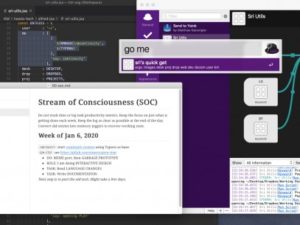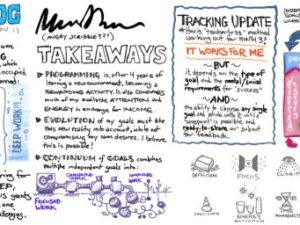(last edited on January 9, 2021 at 9:28 pm)
 SUMMARY: It’s time for the 2010 Groundhog Day Resolutions! I review the past three years of resolutions and create a 2010 master resolution that hopefully will give me a direction for the year.*
SUMMARY: It’s time for the 2010 Groundhog Day Resolutions! I review the past three years of resolutions and create a 2010 master resolution that hopefully will give me a direction for the year.*
Being a lazy-yet-practical sort of person, every year I wait until Groundhog Day to make my yearly resolutions. The rationale, which I explain in further detail in the original Groundhog Day Resolutions post, is that I need to rest from the holidays before I’m in the right frame of mind to make important decisions. So I wait. January’s chilly melancholy eventually yields to ever-lengthened days, until at last on February 2 the emergence of domestic prognosticating rodents turn our attention to the green promise of a most-welcome Spring. Groundhog Day is, without a doubt in my mind, the finest day to look positively to the future.
That said, I have to admit that my past three attempts at achieving, as opposed to merely iterating, my resolutions has produced spotty results. Partly this is due to the awareness that my choices of resolution have been far too broad, and it’s also partly due to the memory of writing-up the disappointments of my Groundhog Day Resolution Reviews. These reviews, designed to keep focus on resolutions throughout the year, occur on every month and one day after 2/2, so the easily-remembered review days are 3/3, 4/4, 5/5, etc. In many of my reports, I would discover new insights in the place of concrete progress. So it was with diminished enthusiasm that I reviewed the year-end reports from 2007, 2008, and 2009.
What I found, to my surprise, was that a lot of it seemed to fit together. Three years means three data points, and suddenly I can see how the journey and regular review have conspired to get me to the state-of-mind I am in today. That state of mind is it is time to build. In a way, this post is the culmination of five years of blogging insights.
But before I get to that, I want to review what a resolution should be.
So what is a Resolution?
So what is a resolution? I really was not sure, so I applied everyone’s favorite high school essay shortcut: look up the definition of resolution. After a quick skim of the Wikipedia article, I believe the general idea is that you’re making a serious promise to make permanent change in your life, standing resolutely in the face of guaranteed difficulty, to better yourself. This is a pretty popular idea; according to research by John C. Norcross, a professor of psychology at the University of Scranton, some 50% of Americans make a New Year’s Resolution. However, only 1 in 5 make it stick for more than 2 years. Wikipedia further quotes a UK study of some 3000 people in which the surveyed rate of success was only 12%.
Though the numbers are grim, there ARE ways to improve the odds. There appear to be around five habits practiced by successful resolution keepers:
- they break big goals into smaller, realistic steps
- they ask for and receive support from friends and co-workers
- they reward themselves for successes
- they maintain a positive attitude, focusing on the good of the new habit instead of the loss of the old habit
- they do not blame themselves for slip-ups
In other words, these habits help ensure that there is adequate and constant feedback from both the self and from other people, and that a positive attitude suppresses self-punishing thoughts in favor of the counted blessings of the new habit.
In the construction of this year’s Groundhog Day Resolutions, I’ll need to make sure that I hit all these points. In a way, I’ve approached them intuitively; the act of even writing about my GHDR experiment is a form of externalization of feedback, and the regular monthly reviews provide needed time for reflection and re-adjustment of strategy. I’ve also followed the “positive attitude/not blame myself” approach to some degree, because it’s part of my Printable CEO design philosophy. However, I have never asked for support, nor rewarded myself. And I haven’t been good about breaking the BIG goals into small, realistic steps. I believed that I should focus purely on willpower and self-discipline; this apparently just increases the chances that I’ll fail. The smart thing to do would be to use ALL of the habits to ensure success. It may feel like a failure of character or ability to NOT just will myself through it, but perhaps what’s more important is that I actually get some stuff done.
That said, I still need to know what my big goals are in the first place. That requires a quick review of my past GHDRs, as depressing the thought of revisiting three years of that low-yield effort may be.
As it turns out, it wasn’t all so bad.
Resolutions of Years Past
Here’s the quick recap:
In 2007, I decided that I really wanted to make money from doing what I love, which I figured was writing and making stuff. That became one of three major focuses; the other two were creating a sustainable social network and sell a product. None of these really came to fruition in 2007, so they were extended through 2008. I came up with a few more specific resolutions, but none of them came to pass and I essentially gave up. However, one things that did come out at the end was a master resolution: Seek truth, make it visible to others as part of what drives me.
In 2009, already weary of the process and working on a large museum project at the same time, I didn’t even start the resolution definition process until April. The first two resolutions were restatements of my 2007 resolutions: write about what catches my eye, create that which illuminates and achieve financial independence through what I create. I knew it wasn’t going to be the “fast track” to money, but it was the way I decided I wanted to do it. A little later that year, I finally noticed that the more I worked with other people on their projects, the better my own projects seemed to go. That lead to a new directive: Be involved with dreams that are larger than myself.
By the end of the year, my Groundhog Day Resolutions had coalesced into a set of principles:
- Communicate with a variety of people in a variety of ways. Be interested! Have real conversations with them! Do it face-to-face, and through online media.
- Create tangible new things every day, then show what you’ve made to those people you’re talking to.
- Be involved in other people’s dreams that are larger than yourself, with people I like and respect.
These are external principles that seem to serve me well, and they have been stated for the past five years of my blogging in various ways. It hasn’t been always easy to maintain the momentum, particularly when it came to creating everyday. However, late in 2009 I had formulated two additional principles, which are curiously-contradictory:
- Just do is about doing something that changes something about the world, and then quantifying its effect. This is the action-oriented, metrics-based approach to productivity we’re familiar with. This is the direct approach.
- Just be, by comparison, is more about observation and context than action. The change in the world, come from the cycle of observing what is happening, and then reacting to it as part of the mysterious flow of it all. This is a more artistic approach to life, and the surprising thing is that the world also changes just by your being in it.
Finding the balance between “just doing” and “just being” is helping to unlock my creativity and productivity. With this settled for now, I started to realize that it was time to step up; from this came the series of (My) World Domination articles in late 2009, which mapped out the terrain before me, what I had for resources, and a growing sense that it was time to plan a journey to one of five destinations I describe as “business opportunities”. That’s what’s been on my mind for the past few months.
Resolutions for 2010
2010 is about leadership and making a financial vehicle to see me to the end. 2010 is the first year I have, thanks to Google Wave with Colleen™, an actual end game. This is my resolution:
To create with and be around people I like and respect, and make an honest buck.
I think everything flows from that. We shall see! I’m choosing four goals that I think will contribute:
- Create a package for each of the five destinations that can be sold on Amazon or offered as a service.
- Recruit people who are interested in being part of Dave Seah caravan.
- Expand the product line from 1 to 5 things by the end of the year.
- Offer it all (and more) on the website.
All the other operating principles are in effect as well, which will improve my chances of making it:
- Be part of something bigger than myself.
- Make and show new stuff, every day.
- Keep the conversation alive and interested with everyone who will participate.
- “Just Do” or “Just Be”, as the situation calls for.
- Strategize in small steps. Measure by tangible results.
- Be brave enough to ask for help.
- Reward myself on the journey in recognition of progress
- Maintain focus on the positive, not the negative
- Don’t punish myself up for slipping up. Lead forward!
Ok, 2010! Let’s get it on! The next review day is March 3, 2010.





8 Comments
I tend to read your site intermittently, and over the years, GHDR is the one idea that has really intrigued me – and I’ve been doing it (somewhat unsuccessfully) ever since.
I’ve found your kickoff post this year added quite a few useful little points to my own thoughts. I was intrigued to see that your introduction here had some similar themes to mine.
Thanks for sharing your work so freely.
Great post,Dave. You share so much of yourself in these posts! My own take on this is a little different (see it at http://stephenpsmith.com/blog/2010/02/goal-setting-gtd-productivity-groundhog-day-resolutions/) as I have chosen the path of finer granularity, that is, I decided that my over-arching goal is the same as it ever was, to create a global microbrand or two.
So my GHD post yesterday was more focused on what I have planned for the next few months, taking my strategy and breaking it into discrete tactical steps that support that strategy.
I like the way that you have been spending so much time and energy thinking about the big picture. It sounds like that was missing from your planning and thinking of the last couple of years. It is interesting that I have been reading your world domination posts with amazement in how closely your intentions match my own.
Whatever I can do to help, please let me know. I’m just up the road…
As an aside, this entire process has made me re-think the book I am writing about productivity – it is becoming as much of a “why it is so” book as it is a “how to” book.
Resolution comes from a Latin verb that means to loosen. So we have the idea of breaking things into smaller parts – a bit like David Allen’s @ next action. Rather than digging in one’s heels, perhaps we should discover and focus on the casue if we want a particular effect.
As always, I love reading how your mind works, how you struggle with various topics (and ones that are dear to my heart). Although, like you, I have at my disposal several ways to make excellent money, I don’t take them, instead I go for what interests me passionately, what I care about, and I forget about making a lot of money. I have always been like this—and the biggest draw for me is something that is intellectually novel, a new problem, and new solution, a new perspective. I’m an evolutionary (and clinical) psychologist, a professor at a clinically focused school of doctoral students, and I’m facing the fact that i hate reading (and writing) very scholarly papers for journals. I love writing my commentaries on my student listserv (now over 300 students, many of whom are out there building their practices, or colleagues, clients, even the chief editor of psychology today heard about my listserv and commentaries, and now is on it. This is the writing I love to do, commentaries, short essays on news in psychological science, or the world of psychology. But this doesn’t and never will lead to money, or not that I can see. I follow your process closely as I think it relates to my own situation. Thanks for continuing to lay it all our for us, your readers, to follow.
“serious promise to make permanent change in your life, *standing resolutely in the face of guaranteed difficulty*, to better yourself.”
Difficulty, challenge, complexity, complication. These are things we usually tend to avoid or see as big negatives. Or do we? It turns out that we only avoid difficulty, challenges, complexities and complications in a series of contexts while we tend to enjoy them and even seek them out in others. Which others?
Games.
Standing resolutely in the face of guaranteed difficulty is EXACTLY what a person who wishes to play a game (a game in the traditional sense of the word) does. In fact, it could be argued that without the knowledge that there would be a challenge to overcome, the game seems void and meaningless (and certainly less FUN)
—-
“I believed that I should focus purely on willpower and self-discipline; this apparently just increases the chances that I’ll fail. The smart thing to do would be to use ALL of the habits to ensure success.”
I agree. In fact, there is a toll to the vigilance of self-discipline as well as exhaustion on willpower that we (as in me, and apparently you) fail, time and time again, to take into account. This does not mean that willpower and self-discipline do not work, but that their usage should perhaps be more of a surgical strike rather than the bulldozer machinery that some times we want it to be.
Habits, tend to define the status quo. They are, by definition, the path of least resistance. The strategy of choosing positive and complementary habits and the tactical challenge of implementing them in the long run are, I believe, some of the key things that should be tackled.
Hope that stirs some thoughts.
Cheers!
Federico.
Good luck on the money making plan. This last year has been one of the most difficult for me financially. I essentially graduated from law school in 2008, passed the bar, and couldn’t practice law. So I started learning Web Dev/SEO. A thousand failed schemes later I am a little bit wiser and planning to try another thousand to see which will actually stick.